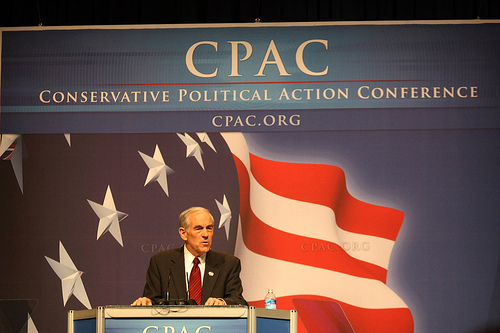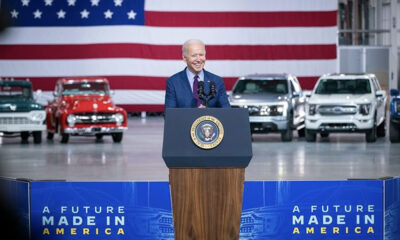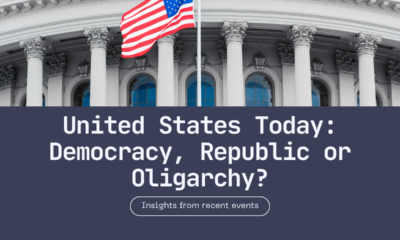Editorial
Ron Paul Pro and Con

Ron Paul gives people many reasons to recommend him or to decry him. But to judge him properly, one must argue honestly and thoughtfully. Many of the arguments that some have offered against him are specious. But Ron Paul as President would present other real problems. The question becomes: how bad would those problems be, could men of good will work around them, and what other problems would he solve?
Ron Paul Con: Brand Management
Professional ghostwriter Kathleen Gee has observed, on The Daily Paul and in this comment space, that Ron Paul has not managed his “brand” effectively. During the period between his two careers in Congress, Ron Paul had retired to the private practice of obstetrics and gynecology. He also formed a layman’s investment advisory firm, called Ron Paul Associates, that published four newsletters that bore his name. Gee estimates that 10,000 articles are at issue, far too many for one man or even one ghostwriter to create in the time in question. (She also points out that Ron Paul Associates existed in the era of typewriters and dedicated word processors, when personal computers were a novelty and graphical user interfaces, with their cut-and-paste clipboard applets, were clunky at best.) More to the point, she says that those newsletters came out when Ron Paul never thought that he would go into politics again, much less run for President of the United States.
All that to say that Ron Paul has not managed his brand well. He allowed several writers (possibly including Lew Rockwell) to write over-the-top and faintly offensive copy for a narrow circulation. Many of these articles predicted things that have never come to pass, like wholesale rioting in city centers. Some of those things might still happen, but not for the overt racial reason that the articles predicted. The Greeks of today are not running riot in Athens and other cities on account of racial differences. They are running riot because the government benefits are about to stop. That could well be all that Ron Paul meant to say would happen in America. Somehow his ghostwriter(s) translated that as expecting blacks to run riot because they are black. That’s the disaster, and the disgrace.
And even so, the oft-cited eight-page advertising letter has only one reference to “race warfare.” Perhaps one such reference is one too many. But one reference does not make the letter into a bigoted screed. Most of the letter speaks of the kinds of policies that, arguably, have led to the Greek riots.
Conclusion: Ron Paul was right, but whoever wrote that copy used bad choices of phrase and worse modes of expression. One would hope that a President Ron Paul would not hire any of those people as his Presidential speechwriters. (And as Kathleen Gee would almost surely ask, how many Presidents of the United States write their own speech copy? Probably none, considering the incredible demands on a President’s time.)
The way Ron Paul expressed himself in a debate or a speech is a related problem. He does not have the polish that Ronald Reagan had, or even that Bill Clinton has. Few Presidents do, and Ronald Reagan came by his polish through years of professional training and experience. Other Presidents seem to find their extra poise on the job. Perhaps Ron Paul can do the same.
Ron Paul Con: Foreign Policy
Ron Paul’s views on foreign policy are a much more serious problem, and for some, a deal-killer. Former aide Eric Dondero said in detail that Ron Paul is basically an isolationist (or as Paul and his friends like to say, a non-interventionist). More recently, CNSNews.com quoted Ron Paul as saying that Iran would have the right to close the Straits of Hormuz to international shipping in response to international sanctions. He might or might not understand that international law (including the current United Nations Convention on the Law of the Sea) treats this issue. No country may deny innocent passage to the ships of another country from one body of international waters to another. The country that does that is suddenly at war with every other country that such behavior could affect. Closing a strait cuts off the ports on the waters inside it, and denies goods and custom to every country who trades, or could trade, with the country owning those ports. When Gamal Abdel Nasser’s “United Arab Republic” (i.e., Egypt) closed the Straits of Tiran in 1967, he cut off the Gulf of Aqaba and the Israeli port of Eilat. Israel ultimately went to war to, among other things, reopen those straits and keep them open.
At issue today: the Straits of Hormuz might (or might not) be Iranian territorial waters. But the Persian Gulf and Indian Ocean are international waters. If Iran closes those straits, then the world must decide whether “freedom of the seas” and “innocent passage to and from international waters” means anything. At further issue: whether an Iran armed with nuclear weapons, and able to deliver those with intermediate-range ballistic missiles, would make the world an unacceptably dangerous place to live. And Iran is definitely trying to develop both. And not every libertarian agrees that a nuclear-armed Iran would be an acceptable risk.
All this is part of a broader argument that Ron Paul likes to make: the world does not need a universal policeman, and the country that tries to be that policeman cannot at the same time offer the benefits of liberty to its own citizens or subjects. “War is the health of the State,” said Randolph Bourne. Ron Paul obviously agrees.
Ron Paul sometimes sounds as though he expects better of foreign powers than a reasonable man would have a right to expect. This is especially true of nation-states like Iran, whose leaders routinely speak of wiping other nation-states off the map merely because those other nation-states exist, and their existence offends their religious sensibilities. Some libertarians try to deny that anyone ever says such things. Others say that the intended targets, in this case the Republic of Israel, have ample means of self-defense or retaliation. Still others say (as Eric Dondero quoted Ron Paul as saying) that defending habitual targets of such scorn and threats is “more trouble than they’re worth.” And then comes the argument that comes closest to winning: the United States is flat broke and cannot afford to be the universal policeman anymore, if it ever could.
An “un-policed” world would be a more dangerous world. If a President Ron Paul suddenly decided that such a world would be too dangerous, it wouldn’t be the first time, and few could blame him. And some of his other policies might enable private operators to manage the danger themselves. The country would need to revisit many other international conventions, including the convention against privateering. (Or perhaps distinguishing privateering from armed self-defense in international waters would be enough.)
The Congress shall have the power…to grant letters of marque and reprisal… [Article I, Section 8, Clause 11]
Ron Paul Pro: Gold Standard Banking
Recently, commentator Dick Morris made a silly argument against the gold standard banking that Ron Paul advocates:
That would mean that I can’t pay you until somebody digs some yellow metal out of the ground in South Africa!
No, Mr. Morris. It means that I expect you to pay me with an objective value, not with “money” that “exists” because some government said, “Let it exist!” (Or in the Latin jussive subjunctive form, fiat.)
The United States abandoned the gold standard in 1971. That prompted Ron Paul to run for Congress the first time. Ron Paul understands what men like Morris do not: that when a society has more money, but not more goods or services, those goods and services cost more. Inflation benefits the money creator at the expense of the rest of society. A society can tolerate this when the “money creator” has dug in the earth to produce the money (gold, silver, platinum, or more recently, oil). But when a government does the same thing, it lays and collects a tax on every purchase and sale. (That the agency of inflation, the Federal Reserve System, is a private banking network, is a pretense at private activity.)
Ed Crane describes some of the things that Ron Paul has advocated: gold-standard banking, competing currencies, or at least a rule saying that money should stay the same, rather than constantly rise. Of these, gold-standard banking would be best of all. With it, the value of goods and services would stay constant, and people need not worry about “keeping ahead of inflation.” They would also be less likely to buy on impulse, because the same goods available for, say, ten dollars would always be available for ten dollars years later.
Ron Paul Pro: Limited Government
Ron Paul has already proposed to eliminate five Cabinet departments (Energy, Education, Housing-and-Urban-Development, Commerce, and Interior) and cut spending by at least a trillion dollars. Few believe that he can do the second part, but most give him points for trying. Eliminating these departments would start to get the government out of things it has no business being in. A government exists to manage force. That is its only legitimate reason for being. It shouldn’t run enterprises that have nothing to do with its central role in protecting its citizens from murder, robbery, fraud, invasion, and so on. Logically, Ron Paul should not stop there: he should eliminate every Cabinet department except those of State, the Treasury, Defense, and Justice. (The Bureau of the Census would properly transfer to the Department of State. Historically, that Department concerns itself most directly with certifying elections, Presidential succession, Constitutional amendments, and so on.)
Ron Paul Pro: Civil Liberties
Immediately after the September 11 attacks, Congress passed the USA-PATRIOT Act. Most people remember this Act for ordering the FBI and the CIA, for example, to share information that would lead to the arrest of a saboteur bent on mass murder before he laid his trap, planted (much less set off) his bomb, or released his store of a deadly germ. But this Act grants Presidents vast powers that any American would recognize as abusive, and abusable, in any other nation-state. This includes Presidential National Security Letters, plus an instrument suspiciously like a Writ of Assistance that a law-enforcement officer can write on the spot to cover his searching someone’s home without a valid warrant.
More recently, the National Defense Authorization Act of 2012 allows the President, on his own authority, to detain any person, citizen or not, without warrant, without charge, and without access to an attorney, indefinitely. True enough, the Constitution does allow an exception in case of “rebellion or invasion.” Neither condition applies today. Furthermore, the Constitution does give the government a tool to handle properly an American citizen who in effect makes war against his own country: try him for treason.
Detention without formal charge is one of the four sins that the late Ayn Rand listed as acts which, all together, could justify the invasion of one power by another to free its people. (The other three are execution without a fair trial, forbiddance or restriction of ex-migration, and censorship.) A society that does even one of those things is not free any longer.
To those who raise the public-safety issue anyway, Ron Paul would almost certainly have a counter-argument: let the people arm themselves. A Ron Paul would never suggest, much less authorize, an Operation Fast and Furious. He would rely on the people themselves to look after their own safety. The common law recognizes any person’s right to defend himself, even with deadly force. And an armed society is an inherently harder target against invasion or sabotage.
Conclusion
Ron Paul’s “brand” depends not on newsletters that went out twenty years ago to a limited circulation, but on what he says today. Most of the arguments against Ron Paul, especially about domestic policy and homeland defense, are specious or even self-serving. They go to whether America will be a country of free people making their own decisions and taking responsibility for themselves, or of overgrown dependent children.
The foreign policy arguments are the strongest. They go to whether Americans want to accept a world filled with dangerous men who move unchecked , and might combine to attack one of America’s few friends, namely Israel.
Ron Paul has his supporters, who often threaten to “go third party” and hand the election to Obama. But if Ron Paul really wants to be President, then he would do well to improve his “brand” and make one of two cases. Either America ought to accept the risk of a sneak attack, or an abduction of an American abroad, or an attack on, say, Israel, or Ron Paul must show that he will thwart the danger. Only he can make the case. He has made a case to his followers. But he must make a case to the rest of the voters, if he wants their votes.
Related:
- Ron Paul in perspective
- Ron Paul more winnable?
- Ron Paul under fire
- Ron Paul winnable?
- Iran nuclear program blasts: accident or sabotage?
- Ron Paul poll results distorted
- Ron Paul digs in deeper
- 9/11 conspiracy theories
- Ron Paul assaulted – rumor
- Ron Paul kills the deal
- Ron Paul poll position
- Ron Paul against dependency
- Ron Paul Russia Today flap
- Ron Paul target: guilt by association?
- Ron Paul – isolationist
- Ron Paul runs for President
[amazon_carousel widget_type=”ASINList” width=”500″ height=”250″ title=”” market_place=”US” shuffle_products=”True” show_border=”False” asin=”0446510998, 0470047666, 0385512244, 0470612533, 1449555381, 1586489941, 1451542291, 047047453X, 1460954262, 193317496X” /]
[amazon_carousel widget_type=”ASINList” width=”500″ height=”250″ title=”” market_place=”US” shuffle_products=”True” show_border=”False” asin=”B002EQA102, 0471679526, 044654146X, 0789209284, 0688123635, 0345461924, 0253349184, 1929354002, B00005S8KR, B000RPCJPC” /][subscribe2]
Terry A. Hurlbut has been a student of politics, philosophy, and science for more than 35 years. He is a graduate of Yale College and has served as a physician-level laboratory administrator in a 250-bed community hospital. He also is a serious student of the Bible, is conversant in its two primary original languages, and has followed the creation-science movement closely since 1993.
-

 Executive4 days ago
Executive4 days agoSecret Service chief gets no solace
-

 Executive3 days ago
Executive3 days agoWaste of the Day: Louisville Taxpayers Pay Nearly $600,000 For Empty Building’s Maintenance, Security
-

 Guest Columns5 days ago
Guest Columns5 days agoFear Itself: Democrats’ Favorite Strategy Caused Their Current Chaos
-

 Executive3 days ago
Executive3 days agoWhere is Joe Biden – or Jill?
-

 Executive2 days ago
Executive2 days agoWaste of the Day: Throwback Thursday: Cities Used Crime Prevention Funds on Soccer Games, Paper Shredding
-

 Executive2 days ago
Executive2 days agoFacile and politically motivated suggestions
-

 Civilization5 days ago
Civilization5 days agoBuild Iron Dome in the United States To Prepare for Israel’s Worst Day
-

 Executive2 days ago
Executive2 days agoBiden makes farewell whisper
















So as a new year is about to begin, the interesting question is which candidate among the current remaining field do each of the CNAV editors endorse, and why?
The reality may be that none are acceptable enough to fully endorse, and that’s a completely legitimate position as well. The follow-up question to the editors, then, is which person would they endorse as the GOP candidate in 2012 despite their non-candidacy, and why?
Thanks, and have a safe, happy & healthy New Year!
“United Nations Convention on the Law of the Sea”
Unless you included this as a “even the —” quip for the liberal-minded, I’d be hesitant to invoke anything declared by the U.N. in support of conservative arguments.
“The country that does that is suddenly at war with every other country that such behavior could affect.”
Exactly the point. Keyword: “DOES”! Let them be the first to ACT (as opposed to TALK) aggressively and violate law and bring Ragnarök down upon their heads rather than the United States’ current habit of behaving like Calvinist pre-crime cops ever vigilant to stop the “Next Hitler” . . . just in case. We lose the moral high ground otherwise. Despite the geopolitical landscape and the opinions of neocons, the United States does not have a divine mandate (we are not ancient Israel and the world is not Canaan) or an official multinational deputization to police the planet as Team America. It’s just that simple so that only really smart people can make it impossible to understand.
Ron Paul is the best choice. Everyone else is the same flavor of RINO vanilla with prettier wrapping paper, or “branding” if you prefer. The fact that he wants to “mind his own business” (which, despite many media attempts, is not code for bury our heads in the sand) in line with classical conservatism thought but is nonetheless tiresomely “branded” as an isolationist by contemporary conservative and liberal pundits only goes to show you how far removed from classical conservatism we’ve come (à la, “Reagan” conservative, for starters). Besides, NOT minding our own business hasn’t worked out so well. Nevertheless, like Paul Krugman’s surreal and worthless observation of the economy, that’s only because we haven’t been nosy enough. When we REALLY poke our arrogant nose where it’s not wanted (or entangled as Jefferson put it) then we’ll see real CHANGE we can believe in.
Connect the dots and or follow the money, one can see Ron Paul is the ONLY candidate that honors his oath to obey and protect the Constitution…. look at his voting record, then look at how the rest of the neocons.
What have they given us?
The Patriot Act
Rule of the special interests
Perpetual and multiple wars
Loss of inalienable rights and freedoms
Police state with FEMA camps
Resemblance to Nazi Germany ~1930
Doomed dollar
etc., etc, ad nausea
Any knowledgeable, critical thinker will tell you that if our Constitution had been followed for the last century, we wouldn’t be in mess we are in today.
Any flaws one can find with Ron Paul pale into insignificance to the constitutional traitors he is up against.
http://www.constitutionattacked.com
There’s one, and only one, irony in what you posted here (and also on your own site, I notice). And that is this: a certain witness said that Dr. Paul told him that the American involvement in World War Two, and specifically the clash with Nazi Germany, was never necessary.
Let’s assume for a moment that Dr. Paul really said that. If so, he didn’t understand the historical sequence. Recall: the Japanese (not the Germans) bombed Pearl Harbor. Congress declared war against Japan. Then Hitler declared war against the United States. In reply, Congress declared that America had been at war with Germany for the past two days. And toward the end of the war, Germany developed the Vergeltungswaffen—the V-1 Buzz Bomb, the V-2 Rocket, and—the key—the V-10 New York Rocket, that would have been the first intercontinental ballistic missile.
Not too many people remember the V-10. After all, it never flew. The British destroyed the missile factory that was working on it. So I wouldn’t be surprised if Dr. Paul didn’t know a thing about that. But it’s just the sort of thing that he would hear about if he did become President.
Still, Dr. Paul is the only man who can make the case that he could manage the danger of the modern version of the V-10—an intercontinental, or even intermediate-range, ballistic missile taking off from an Iranian missile base and carrying a nuclear warhead.